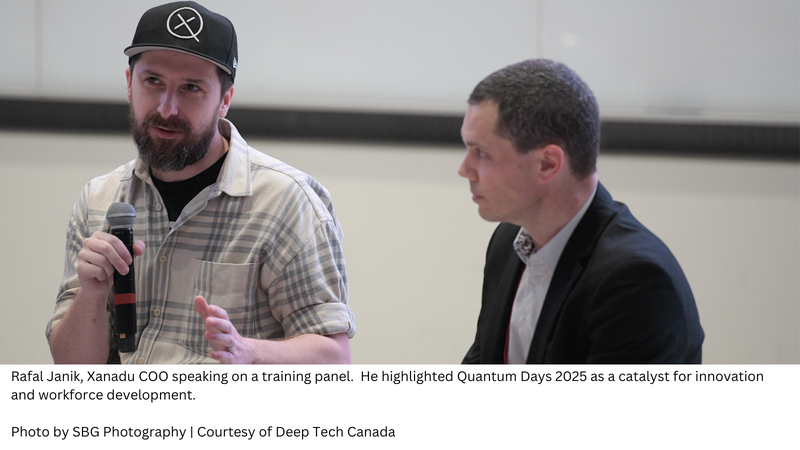Success of U of T’s quantum ecosystem in focus

The Centre for Quantum Information and Quantum Control (CQIQC) at the University of Toronto recently hosted Quantum Days 2025, the country’s premier quantum science and technology event. Co-organized with Deep Tech Canada (DTC), a non-profit dedicated to advancing deep technology and innovation, the event brought together over 400 representatives from across the nation and around the world.
Over the course of three days at the Myhal Centre and Hart House, Quantum Days showcased Canada’s quantum landscape, featuring researchers, technology developers, entrepreneurs, and pioneers. The event highlighted the sector’s recent advancements, key challenges, and explored opportunities that could shape its future.
“CQIQC was honoured to co-host Quantum Days 2025 and welcome hundreds of students, academics, and industry partners,” said Dvira Segal, the centre’s director, a professor in the Department of Chemistry, and program chair of Quantum Days 2025. “The event held special significance as 2025 was designated the International Year of Quantum Science and Technology by the United Nations. This year commemorates the 100th anniversary of the initial development of quantum mechanics,” she added.
“As a global university, U of T is a leader in quantum research, talent development, and commercialization,” said Derek Newton, Assistant Vice-President, Innovation, Partnerships and Entrepreneurship at U of T. “We’re proud to serve as the anchor for the GTA’s quantum hub,” he told the audience at the sold-out event.
When it comes to research, Newton noted that CQIQC is advancing quantum science and technology through cross-disciplinary, international, and industry collaboration. U of T is ranked fifth among universities that are leading producers of quantum research. In talent development, the Faculties of Applied Science and Engineering, and Arts and Science, are contributing to the region’s technology and quantum-ready workforce. With respect to commercialization, Newton explained that a number of notable quantum firms have emerged from U of T, including Xanadu – now a Canadian unicorn – thanks to the university’s robust entrepreneurship supports.
Quantum Days featured over 60 speakers and a range of keynotes, presentations, and panels. The following are a few take-aways:
- Canada’s quantum landscape includes many hubs. This includes hubs in Greater Vancouver, Calgary-Edmonton, Montreal-Sherbrooke-Quebec City, and Toronto-Waterloo-Ottawa. Collectively, these regions are home to over 100 quantum firms that employ 2,600. Speakers discussed Canada’s National Quantum Strategy, which committed $360 million in 2023 for research, training, and commercialization. They emphasized the need for continued investment to maintain Canada’s competitiveness, noting significant investments by Australia ($1 billion AUD) and Germany (€3 billion).
- Canadian researchers in academia and industry are at the forefront of all quantum sub-areas. This includes computing, sensing, materials, and communications. Speakers covered recent advancements, such as Associate Professor Alannah Hallas from the University of British Columbia presenting on the creation of quantum materials using electronic and magnetic properties. Pierre Dubé of the National Research Council of Canada discussed quantum clocks, and Jonathan Lavoie discussed Xanadu’s new quantum computer, Aurora.
- Developing a range of skills is beneficial for trainees. Speakers emphasized the importance of technical (engineering, math, and physics) and other skills. Associate Professor Adina Luican-Mayer from the University of Ottawa shared EU data showing that industry seeks talent with knowledge of the quantum landscape and critical thinking and communication skills. Speakers noted programs like Mitacs Accelerate and NSERC’s Collaborative Research and Training Experience (CREATE) and Alliance Advantage provide valuable hands-on research and industry experience. Industry-led training, such as CMC Microsystems’ programs, also equips students and professionals with essential skills through hands-on learning, specialized training, and opportunities to engage with cutting-edge quantum technologies.
- Entrepreneurship and commercialization support are vital for startups. Speakers highlighted programs like Simon Fraser University’s Invention to Innovation and the Creative Destruction Lab’s (CDL) Quantum Stream at the Rotman School of Management. Since its launch in 2017, this CDL program – the country’s first and largest entrepreneurship program dedicated to quantum-based startups – has supported over 170 quantum companies globally. Entrepreneurship training and mentorship programs are crucial for fostering business growth and retaining companies in Canada.
“Quantum Days 2025 in Toronto was a testament to the strength and momentum of Canada’s quantum ecosystem. The discussions, collaborations, and insights exchanged will drive innovation and reinforce Canada’s position as a global leader in quantum science and technology,” said Dr. Marie D’Iorio, President of DTC.
“We are proud to play a role in bringing together world-class researchers, industry leaders, and policymakers to accelerate breakthroughs and real-world impact. This success would not have been possible without U of T and CQIQC, our incredible partners, and the collective efforts of Canada’s quantum community—thank you for making this an event to remember,” she added.
Reflecting on the conference, Rafal Janik, Xanadu’s Chief Operating Officer, noted, “For Canada to remain a leader in the development of quantum technologies, there must be a strong collaboration between government, industry, and academia; each one contributing their unique strengths to drive innovation and cultivate a future-ready quantum workforce. Quantum Days 2025 created the right conditions to bring these together at U of T.”
Looking ahead, Janik added, “We look forward to continuing our strong and close relationship with the University of Toronto and the CQIQC as one of the premier quantum centers in Canada to promote additional collaboration between government, industry, and academia.”
(Story by Catrina Kronfli)
